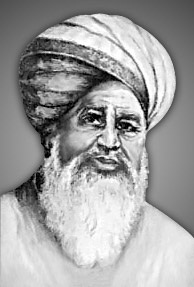Haji Shariatullah
| Haji Shariatullah | |
|---|---|
 |
|
| Born | 1781 Madaripur, Dacca, Mughal India (now in Dhaka, Bangladesh) |
| Died | 1840 Dacca, British India (now in Bangladesh) |
| Nationality | Bengali |
| Known for | Faraizi Movement |
| Children | Muhsinuddin Ahmad |
Haji Shariatullah (1781–1840) was an eminent Islamic reformer of the Indian subcontinent in British India. He is known for founding the Faraizi movement. Shariatpur District is named after him.
Shariatullah was born in 1781 into a petty Talukdar family at the village Shamail under the then Madaripur sub-district of greater Faridpur District in Bengal. His father, Abdul Jalil Talukdar, was a farmer who was not very well off. He died when Shariatullah was 8 years old. After his primary education he went to Calcutta and was admitted to Barasat Alia Madrasa. He then received education from famous madrassa of Furfura Sharif, Murshidabad.
In 1799, Haji Shariatullah travelled to Arabia. He stayed there until 1818 and got his religious education. He learnt Arabic and Persian from his teacher, Maulana Basharat. During his stay in Arabia, he was influenced by the Najdi da'wah started by Muhammad bin Abdul Wahhab, through Tahir al-Sumbal Makki. He even is said to have visited Al Azhar.
See also Faraizi Movement
The Faraizi Movement essentially a religious reform movement had emerged forth during the 19th century, founded by Haji Shariatullah by the Bengali Muslims. The term Faraizi has been deduced from fard, standing for compulsory and mandatory duties ordained by Allah. The Faraizis are, thus, those bunch of men whose only objective is to implement and impose these mandatory religious duties. The promoter and initiator of the Faraizi Movement, Haji Shariatullah, however had represented the term in a different light and sense, implying to assimilate every religious duty ordained by the Quran as well as by the Sunnah of the Prophet, while remaining firmly in the Hanafi school of Islamic jurisprudence.
...
Wikipedia
